The clouds are low and grey; rain is expected later today. We have just had 23 straight days without rain, with high temperatures in the high 80's—about 15 degrees warmer than usual for mid-October. Several friends and acquaintances have asked how the farm is doing. I usually say something like, “The farm is still going and so am I.”
I do not usually broach the question of what is a farm and who is a farmer. Everyone knows that a farmer grows food; just as a woman gives birth. Few people have little direct experience with either activity. They do not know the process intimately. I do.
Rudolf Steiner, the founder of biodynamic agriculture, spoke of the need to develop intimacy with nature. He said we need to “learn from the whole of nature, from the relationships within the whole cosmos.” He spoke of the farmer as someone who meditates and arrives at a way of knowing that is beyond words. “Mere intellectuality is not enough,” he said. “It does not get us deep enough. Nature's life and flow are so fine and subtle, that in the end, the slip right through the coarse mesh of our rational concepts.”
Concepts and misconceptions are easy when they are not grounded in the real world. Today, I got an e-mail celebrating National Farmer's Day from Agrivionline. It shows an image of an older man with a open face. Dressed in blue overalls, a shovel slung over his shoulder, he is standing in front of a field of corn. That field has been planted and tended with a tractor, not a shovel. The copy reads, “Farming is one of the oldest professions out there...Every successful farmer has to pay attention to his soil and crops, while at the same time be a doctor of his plant’s health. Food is literally the beginning of everything; it's the driver that provides energy for our bodies and a way to celebrate special moments with other people.”
I ponder, “Food is literally the beginning of everything...” Is it really? Where is God or Nature in this process? What is food and how do we define our relationship to it? Am I a laborer working in the fields or an artist weaving threads of wholeness with Nature?
Those threads are becoming more taut as the weather becomes more extreme. The plants that love heat are thriving; the plants that flourish in cool weather are suffering. Last Saturday, two teen-age girls picked 55 fresh figs. Yesterday, I picked another three pints of the finest fresh figs of the season—in mid-October. It is supposed to get into the 80's again on Sunday, so I may have one more picking of fresh figs this season. The figs love the heat!

The Michihli cabbage, on the other hand, is bolting—going to flower prematurely. It flourishes in cool weather. It has grown quickly and plumped nicely. But now it is headed to seed rather than putting more energy into creating leaves. My neighbor says it will be hot, not mild this year, because of the heat. All the cabbage family gets sweeter and juicier after the first frost—but there has been no frost this year, and no sign of frost in the 10-day forecast.
I am no longer focused on producing food for markets, though I do still grow the best food I can imagine. I am now working to maintain the essential energy of the garden and of the farm—to keep it lively and healthy even in sudden and dramatic weather changes. I marvel and celebrate the fig harvest; I despair that I will have Michihli cabbage to eat this winter. I struggle to convey the wonder, complexity, mystery and challenge facing an artist whose palette is the land that she tends.
Like Tevye in Fiddler on the Roof, I offer this salute: "To life, to life, l'chaim. Drink l'chaim to life!"
